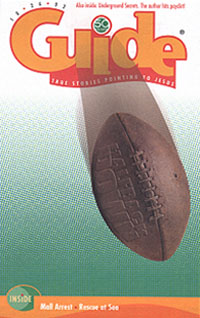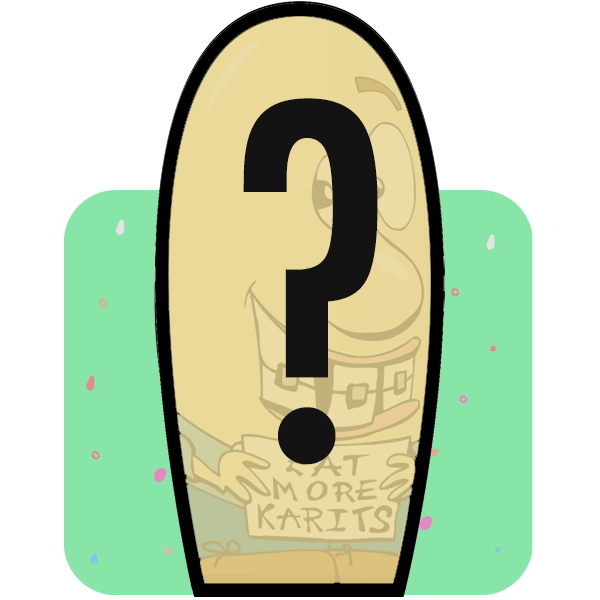Harlan smiled as he pulled on his practice jersey. Coach Talbot had told him he was starting halfback.
Their next game was just two days away. Their opponents, with three wins and no losses, the Mavericks, were the best in the middle school league. And they were real big. They were eighth graders, but some of them looked as though they could play college football!
“No problem,” Harlan mumbled. “We’re fast. We’ve got a great offense.”
Just then Jimmy and Curt came clattering by, carrying their helmets. “Hey, Harlan, when are you going to show me your football wall?” Jimmy asked.
Curt looked surprised. “Football wall? What football wall?”
“Harlan is big-time into football. He has NFL running back pictures plastered all over his bedroom. He thinks the Green Bay Packers will sign him up someday.”
“Be nice, and maybe I’ll let you see it,” Harlan said. “But now we’d better get on the field. We’ve got some serious practicing to do.”
Coach Talbot directed the boys to the 50-yard line. “White team, move into your standard four-man front defense’now! That’s fine. Blue team, we’ll work on your running plays. I’ll give the plays to Jimmy, and he’ll call them to you in the huddle. Jimmy, remember, when the ball is snapped, keep low.”
On the first play Jimmy tucked the ball smoothly into Harlan’s stomach. Harlan ran right, cradling the ball. Good blocking allowed him to run wide and turn the comer. A white team linebacker tackled him from the side, but he spun around and broke free. He didn’t see the second defender until just before a helmet crashed sharply into his chest. He instinctively clutched the ball, took three steps . . . and blacked out.
Harlan didn’t hear Jimmy shouting, “Keep going! You’re in the clear! Quit clowning, Harlan.”
He didn’t hear Coach Talbot shouting frantically in his ear, “Harlan, are you OK?” He didn’t feel the coach checking his player’s pulse and blowing air into his lungs, or hear him yelling for someone to call 911. No voice told him his heart had stopped, and he didn’t know CPR was being performed on him.
When an ambulance paramedic applied paddles to shock his heart into action, his system didn’t respond. Harlan was in a deep sleep in a dark, soundless nowhere. Around him was a whirlwind of action: intubation, a ventilator hooked up, oxygen, straps immobilizing him on a stretcher, an ambulance rushing to the emergency room.
A misty dream formed in Harlan’s mind. He struggled to open his eyes. Everything seemed fuzzy, slightly out of focus.
His new world was a brightly lit room with a white ceiling. A plastic bag clipped to a metal stand seemed to be dripping clear liquid into a tube. A face appeared over him.
“Harlan, I’m Dr. Blanchard. Do you know where you are?”
He tried to answer, but was unable to speak. Instead he moved his head to indicate no.
“You are in St. Luke’s Hospital. You were in an accident on a football field. Do you remember that?”
Harlan did not remember.
Over the next three days Harlan’s memory slowly returned. At first he didn’t recognize his parents or his coach. He was sure he saw his retainer lying broken on his stomach, and that worried him. A nurse gently assured him that what he thought he saw was not really there.
Each time Dr. Blanchard visited him, he asked if he knew what hospital he was in. Each time Harlan said, “St. John’s,” Dr. Blanchard reminded him it was St. Luke’s. When Harlan finally remembered it was St. Luke’s, the nurse kissed his forehead.
Harlan smiled at the attendant who served him breakfast. “Everyone sure is nice. But, boy, will I be glad when they take these needles out of my arm. How many days have I been here?”
“You’ve been here four days. That’s more than most people get to enjoy our hospitality.”
Harlan laughed. “Don’t say funny things, please. It hurts when I laugh.”
By the fifth day Harlan was walking with assistance. He certainly was receiving a lot of attention. It made him feel comfortable. He enjoyed chatting with the nurses.
The morning of the sixth day, Dr. Blanchard entered the room with five people in white coats. “Harlan, I’ve brought a group of specialists with me,” the doctor said. “They have questions that perhaps you can answer to help us understand why you have done so well against all odds. You are making medical history. When this type of cardiac contusion happens in football, hockey, or baseball, most times it is fatal. But you survived. We are calling you our miracle boy.”
That afternoon Dr. Blanchard and Harlan’s parents talked with Harlan about his future. “Harlan, you will not be able to play contact sports again, ever,” said Dr. Blanchard.
“Never?” asked Harlan.
Everyone nodded. Harlan looked out the window. A blur of images raced across his mind. He remembered Jimmy handing him the ball during the scrimmage. Dreams of future football triumphs followed. A somber sadness enfolded him, followed by a growing determination. He would not let this get him down. After a long silence he muttered, “Bad news.”
“I know how you feel,” said his father. “We’ll come up with some new ideas. Other than contact sports, what would you like to do?”
“I’ll think about it.”
The seventh day Coach Talbot arrived carrying a football. “This is your trophy ball, Harlan. It’s signed by all your teammates. They said to tell you that the way you battled back inspired them. We beat the Mavericks by six points.”
“This is cool. Thanks,” replied Harlan, turning the football over in his hands.
“Coach, the doctor says no more football ever. I guess God has other plans for me. So I’m kind of into a new idea. What kind of golfer do you think I’d make?”
Coach Talbot seemed to fight back tears. “You’d make a great golfer, Harlan. You’ll be the best ever.”
There was a pause while Coach Talbot composed himself. “Harlan, I want to share something with you. Do you know you changed my life? I was never much into prayer until your accident. But I’ve been praying like I’ve never prayed before. And you know what? Prayer has had a calming effect on me, given me an intense feeling of being connected to God. Thank you, my young friend. You have helped me reconnect with God.”
They joined hands and remained silent for several minutes.
Finally Harlan spoke: “Tell my buddies I’ll be their water boy.”
After nine days in the hospital, Harlan was discharged and returned home. When he opened the door to his room, there on his football wall were new decorations. Golfing pictures were festooned wall-to-wall. A big banner said, “WELCOME HOME, WATER BOY!” Smiley faces were painted on it, and it was signed by his teammates.
No, he hadn’t played against the Mavericks. But somehow Harlan felt like a winner too.
Illustrated by Ralph Butler



1 thought on “Halfback Down”
♡